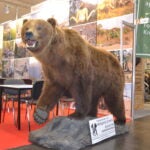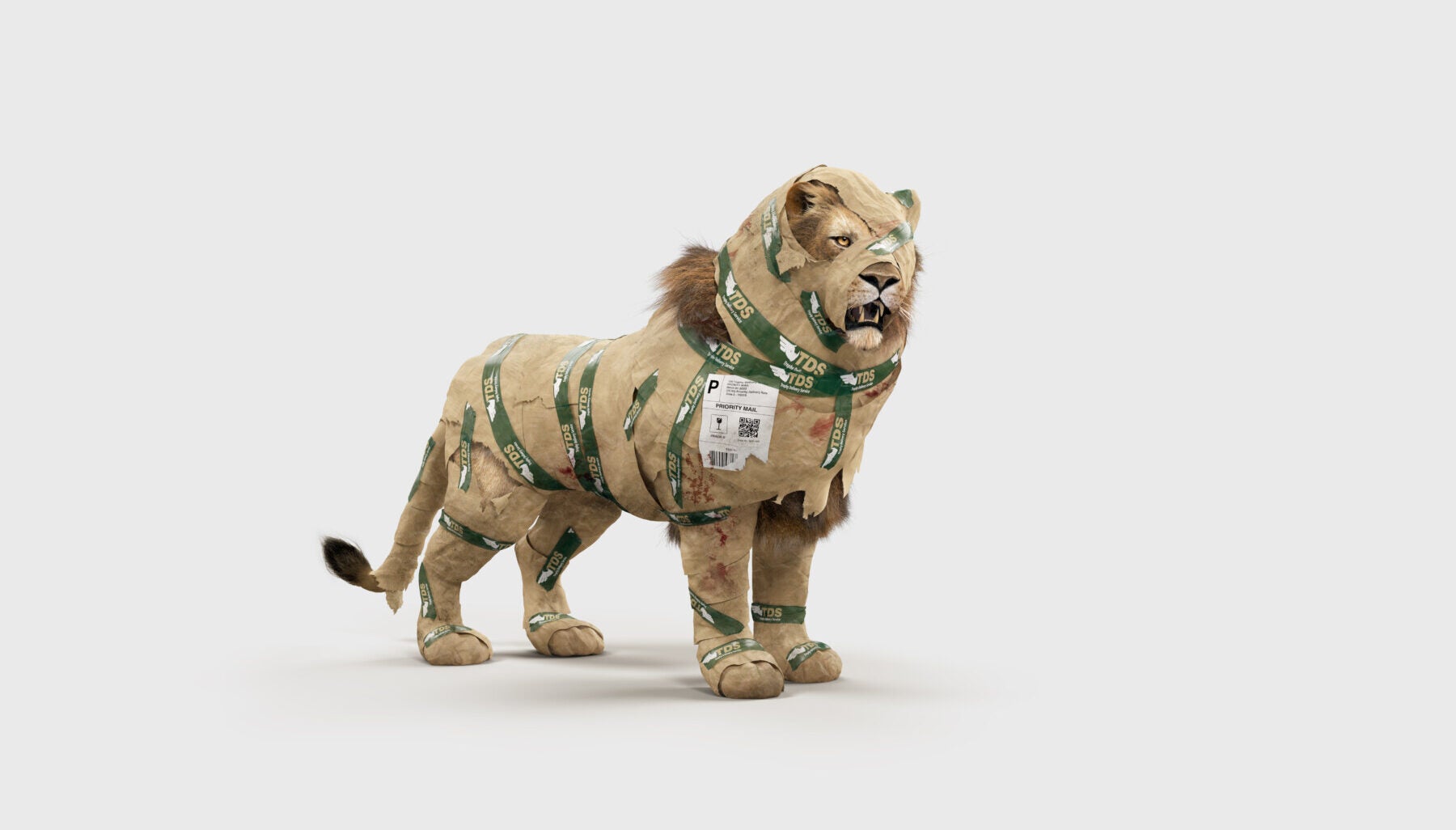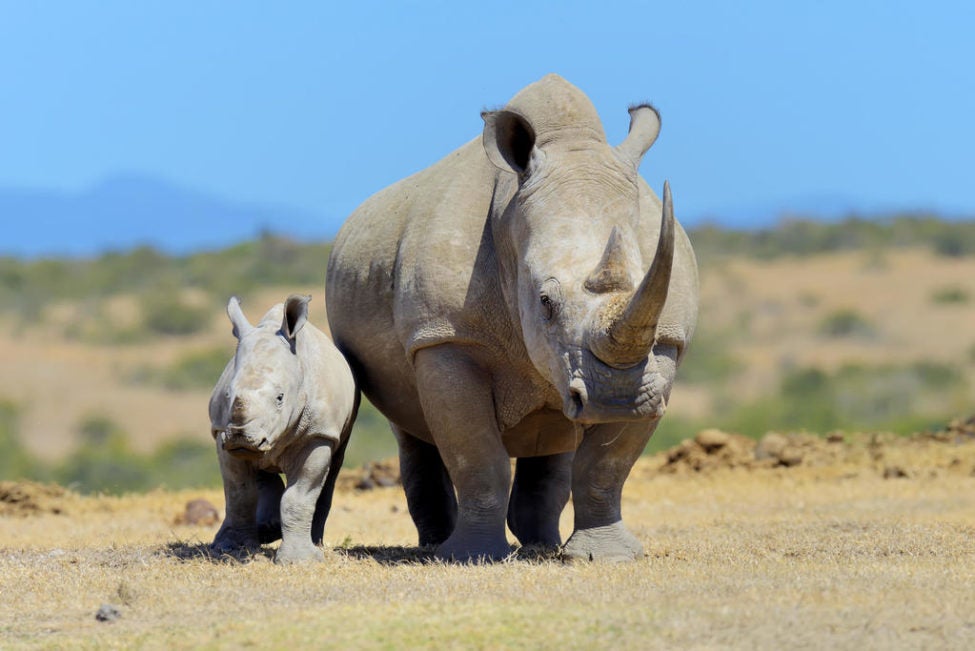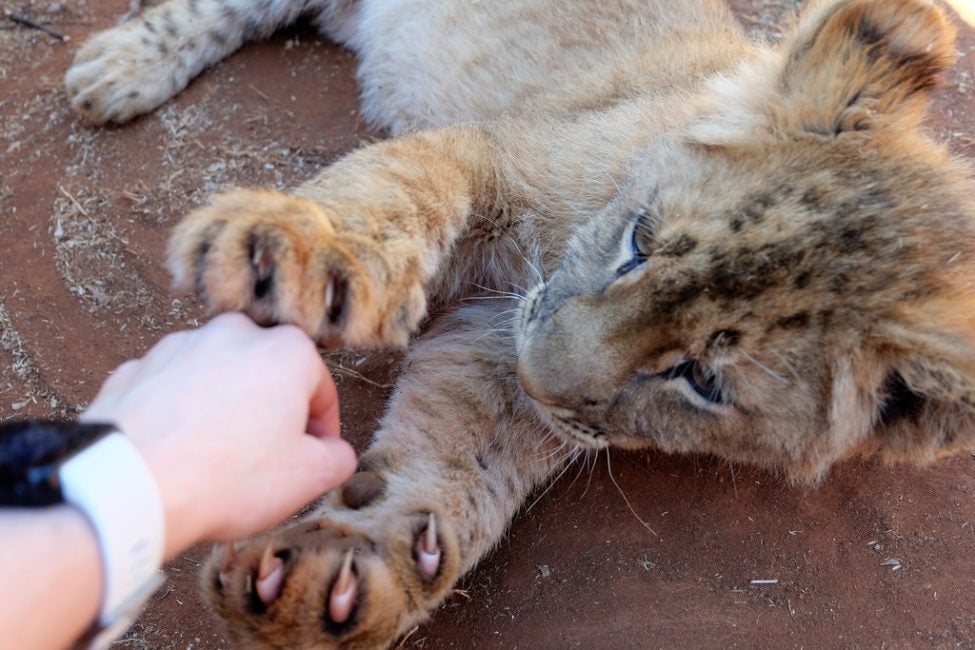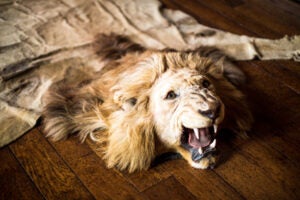
ROME—Yesterday, the Italian media outlet Kodami released a video of their independent undercover investigation undertaken at “Jagd & Hund”, Europe’s largest hunting fair held in Dortmund, Germany from January 24-29, delivering another shocking look behind the scenes of an industry currently under intense political scrutiny in Europe as multiple Member States consider hunting trophy trade bans.
Humane Society International and affiliates have been at the forefront of a global fight to ban the trade in hunting trophies of imperiled species. For years, the Humane Society of the United States has unveiled what happens at the world’s largest annual hunting fair hosted by Safari Club International in the United States, working to unmask the hypocrisy of the trophy hunting lobby and its attempts to greenwash the exploitative industry while lobbying against endangered species protections.
Kodami’s investigation findings add to a growing collection of evidence of trophy hunters’ political equivocation and blatant disregard for conservation principles. Many hunters are condemning trophy hunting as unacceptable in modern society. Multiple investigations by HSI and the HSUS over the years revealed:
- The presentation of trophy hunting as a well-managed, conservation-focused industry is a farce. When gathered together at these conventions, outfitters and trophy hunters have undermined or outright dismissed ethical and animal welfare considerations. At the Staffordshire County hunting fair in 2022 an HSI investigator asked if he could drink alcohol while on a hunt in Africa. The outfitters’ response was: “Yeah, they [expletive] don’t give a [expletive] over there. [Expletive] me if you want to go around with a beer and a cigar and [expletive] blast stuff. They’re pretty laid back.” This crude, irresponsible sentiment was seen across multiple investigations, outfitters and guests.
- Trophy hunting outfitters at the fairs use gimmicks and deep discounts on animals’ lives to increase sales. Many offer canned hunts—where the animal is bred and shot in captivity—or “easy” hunts where they can guarantee a kill for a client.
Outfitters push marketing schemes meant to maximize hunt sales regardless of the hunters’ proficiency by promising a family-like experience with the guides and glorifying the adrenaline of trophy hunting, preparing inexperienced clients in as little as a day. They also claim to “bend the rules” around hunts and ethics, offering clients the option of hunting from the back of trucks or setting up captive hunts.
- Children are often present and featured in promotional material to encourage family engagement. It was apparent to HSUS investigators that killing animals for pleasure and keeping their body parts was being normalized for children at these conventions. One conference attendee attendee told investigators that he and his children participated in a canned hunt, killing “their” lion within 90 minutes.
- Investigators found that the hunting community is not united in support of trophy hunting. Many hunters believe that captive hunting, baiting and hunting from a vehicle violate fair chase ethics, while others don’t support hunting of iconic or imperiled animals or hunting animals when meat consumption isn’t a primary driver.
Kodami’s investigation video further proves what Humane Society International has been pointing out for years: the trophy hunting industry’s economic model incentivizes over-exploitation which can push imperiled species like lions, leopards and elephants further towards extinction. The sales model found across all conventions indicates that the value of wildlife is determined by consumer demand, not by their intrinsic value, conservation status or value to local communities. Trophy fees can run up to US$65,000 for wild lions and US$35,000 for leopards and are typically around US$40,000 for an elephant, depending on the size of their tusks. The record auction for a hunt of a black rhino—one of the most endangered mammals on the planet—was at the 2014 Safari Club International convention for US$400,000. However, the industry also chooses which animals to devalue either by setting trophy fees low such as for ducks, doves and guinea fowl “worth” only US$5; by offering extreme discounts for the hunting packages (a giraffe hunt was offered for US$1,200 as “a giveaway”); or by offering animal kills for free as bait, such as hippos (whose numbers are declining), to draw out the target trophy animal such as lions and leopards.
Humane Society International/Europe executive director Ruud Tombrock, after seeing the footage released by Kodami yesterday, commented: “Trophy hunters can’t seem to hide their passion for carnage or complete disrespect for animals for long when they all gather together at conventions like the Jagd & Hund in Germany, Cinegética in Spain, and Safari Club International’s in the U.S. Undercover investigations like Kodami’s and ours are vitally important to dispel the ‘helping hand’ fantasy that the hunting lobby has peddled to policymakers and the public. These false representations of the industry have so far secured for them hunting and trade policy exemptions for imperiled wildlife they shot for fun where it would otherwise be prohibited. We cannot let this pandering continue under their lobby’s false narrative. Policymakers need to see their true nature and put an end to facilitating their abuse of wildlife.”
Background:
- The EU is the second largest importer of hunting trophies with 14.912 hunting trophies from 73 different CITES-listed mammalian species imported between 2014-2018, such as leopards, hippos, elephants, lions and even species like the critically endangered black rhino. Hunting fairs played a significant role in the promotion and sale of the represented hunts.
- More and more transport companies pledged to prohibit transporting of hunting trophies. Find here a list of more than 30 airlines, freight carriers and businesses from the transport sector that have a passenger baggage or cargo policy against hunting trophies.
- HSI/Europe has been advocating for a ban on hunting trophy imports with its campaign #NotInMyWorld aimed at the European Union and Member States since 2021. Our petition to the European Parliament calls for urgent action to ensure that the existing requirements of the EU Wildlife Trade Regulations and Habitats Directive with respect to hunting trophies are being properly implemented, as outlined in commitments in the EU Biodiversity Strategy.
- We’ve made significant progress to date:
- On June 21st the French Assembly adopted an amendment that will significantly assist customs authorities in limiting the import of hunting trophies of certain endangered animal species into France by an overwhelming majority (113 votes for, one vote against). This vote coincides with a new legislative proposal for a ban brought forth by Senator Céline Boulay-Espéronnier on May 23.
- In March 2023, British lawmakers in the House of Commons advanced legislation that would ban the import of animal hunting trophies from over 6,000 internationally regulated species, including elephants, rhinos and leopards. The bill is currently under consideration by the House of Lords.
- Last year in Italy, IEG Italian Exhibition Group SpA announced it will no longer host the HIT Show (Italy’s largest hunting fair with 40,000 visitors and hundreds of international exhibitors each year) citing explicitly the event’s incompatibility with environmental values and mission of the event.
- Finland banned the import from outside the EU of hunting trophies of species protected under Annex A and 12 species under Annex B of the EU Wildlife Trade Regulations in 2022.
- The Belgian federal parliament unanimously called on the government in 2022 to immediately stop issuing import permits for trophies of species protected by specific international trade regulations.
- The European Parliament adopted a resolution in 2022 calling for an end to the import of hunting trophies into the EU of protected species.
- In 2016, the Netherlands banned imports of trophies of more than 200 species, and in 2015, France banned imports of lion trophies.
ENDS
Media contact: Eva-Maria Heinen, communications and PR manager for Germany&Italy: emheinen@hsi.org

